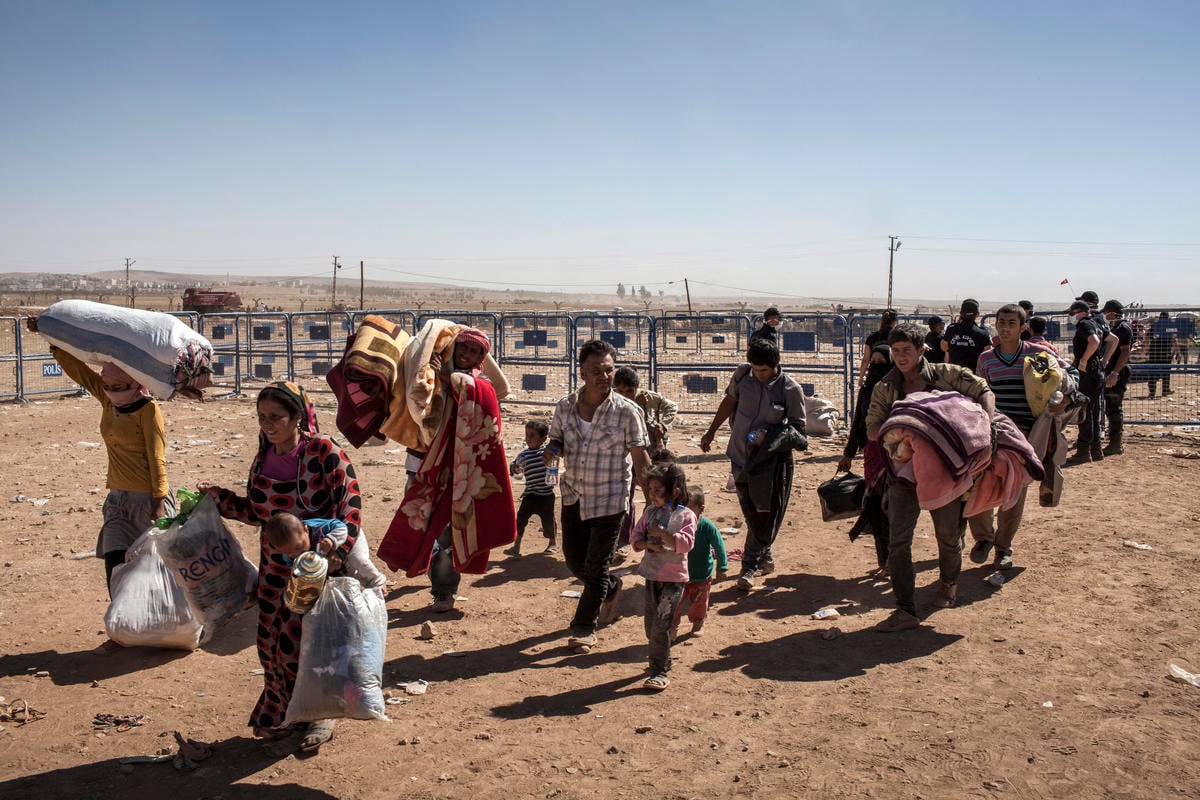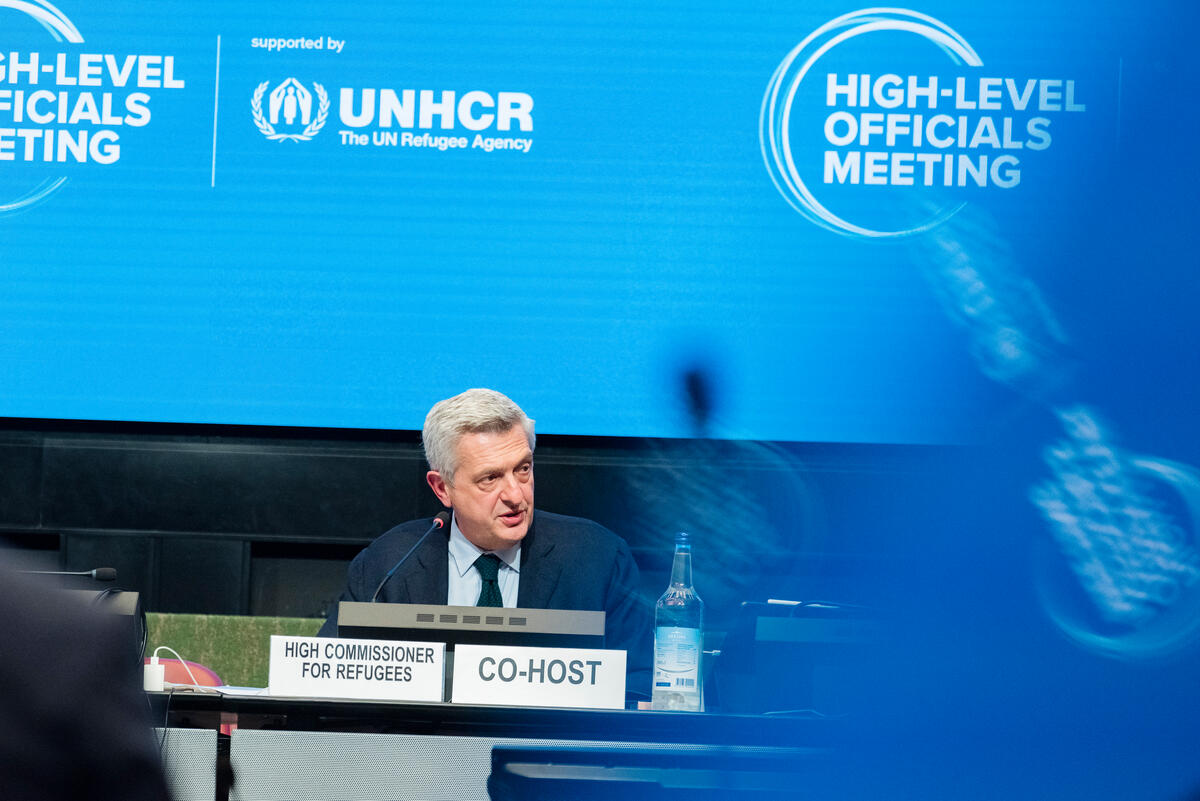Live blog: Global Refugee Forum -- Day 3
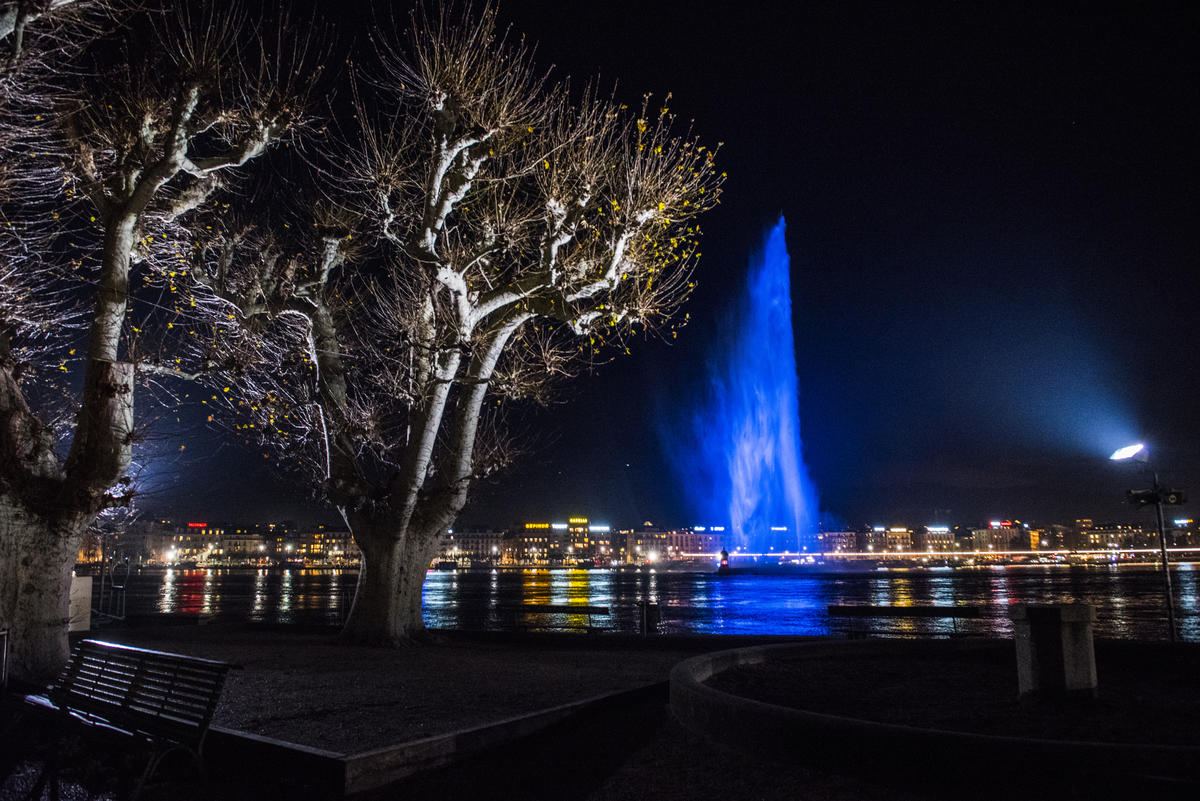
Live blog: Global Refugee Forum -- Day 3
The first Global Refugee Forum comes at the end of a tumultuous decade in which the number of refugees worldwide has doubled to well over 25 million.
From 16–18 December, the international community is coming together to announce bold, new measures to ease pressures on host countries, enhance refugee self-reliance, and find lasting solutions for those uprooted from their homes by wars and persecution.
Check back here throughout the day for updates from Day 3:
Concrete pledges to transform refugees' lives
As the Forum draws to a close, it's time to take stock of how the commitments made over the past three days by governments, interational organizations, businesses and other stakeholders will benefit the lives of millions of refugees around the world.
In all, more than 770 pledgesLink is external have been made in areas including school places for refugee children, job opportunities, new government policies, access to clean energy, improved infrastructure and support for host countries and communities.
There were also major financial pledges, including some US$ 2.2 billion pledged by the World Bank Group, a similar announcement from the Inter-American Development Bank of US$ 1 billion, while a broad range of states and other stakeholders pledged financial support for refugees and their host communities of over US$ 2 billion.
The private sector also offered substantial commitments, with more than US$ 250 million pledged by business groups and initiatives launched that will lead to at least 15,000 jobs being made available to refugees. There will also be some 125,000 hours per year of pro bono legal counselling.
“Public support for asylum has wavered in recent years. And in many cases communities that host refugees have felt overwhelmed or forgotten,” said UN High Commissioner Filippo Grandi. “But refugee situations are ‘crises’ only when we let them become so, by thinking short term, by failing to plan or work together across sectors, and by neglecting the communities they arrive in. At this Forum, we have seen a decisive shift towards the longer-term view.”
Getting to college: refugees discuss how to ease access to higher education
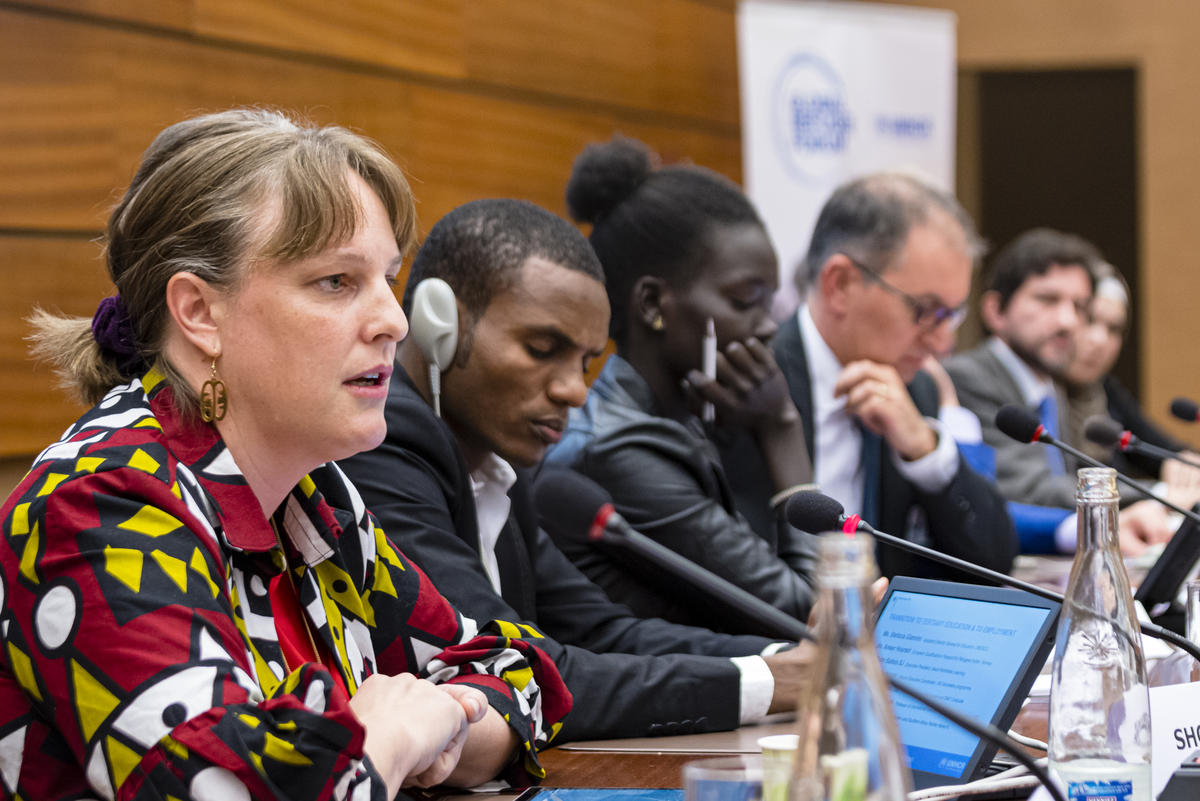
The increase in the number of young refugees around the world gives rise to an urgent question: how best should the leaders of tomorrow, who find themselves refugees today, access higher education?
There is no doubt of the need. At present, just 3 percent of young refugees can access tertiary education -- a figure that UNHCR, the UN Refugee Agency, wants to see expanded to 15 percent by 2030.
A relatively small number of young refugees are able to go to university either in their country of asylum or a third country. At the same time, connected learning has provided an opportunity for many thousands more to benefit from courses at foreign universities from the towns or cities or refugee camps where they study through a blended learning model.
The topic was discussed at a session of the Global Refugee Forum on Wednesday on Tertiary Education. Crucially, it featured several refugees who have actually been to university and were able to share their experiences.
“I can only say that the scholarship I received was my activation card … to hopefully be an active member of society and give back,” said Muhammed Shikhani, a refugee from Lebanon currently doing a doctorate on climate change modeling in Germany.
Refugees who want to study at university face additional hurdles. Language is a barrier for some. At the same time, many countries don’t recognize their secondary school qualifications. The European Qualifications Passport for Refugees is one solution that is being increasingly adopted, panel members said.
Anwar Hourani is a refugee who benefited from thisQualifications Passport to study international public health in Oslo, the Norwegian capital. She called it a “door opener”.
In some places, refugees are deterred by the additional financial burden of being classed as foreign students. Connected learning, or e-learning, lowers the cost and also provides the potential to expand access.
Samuel Niyonkuru, a refugee from Burundi currently in Kenya, said prior to starting a connected learning course with InZone, a programme from University of Geneva, he would walk 9 km each way to get to school, through a forest and across a river. At times, he even faced danger.
“With connected learning I could learn anywhere at any time,” he said. “It is just a click away.”
The session ended with a series of pledges by organizations and governments to boost financial aid and places for the higher education of refugees.
There remain many barriers to improving access for refugees to tertiary education but the argument in favour is clear: Highly educated refugees are best placed to contribute positively in their new host societies. The same is true should they return home.
"Groving" reporter interviews refugee education advocate
Joelle Hangi, a refugee from the Democratic Republic of the Congo, is a business communications student and co-founder of Refugee Artists and Authors, through which she passionately collects and shares refugees’ stories.
She's no stranger to talking about the challenges facing young refugees, and the important role education can play in their lives. But it's probably fair to say the interview she gave today at the Global Refugee Forum was a first for her, as she fielded questions from none other than Sesame Street's Grover...

Ensuring refugee women are at the forefront of humanitarian action

Women and girls make up around half the world’s refugee population but social, cultural and legal barriers, and the experience of conflict and forced displacement, can often impede their opportunities for self-representation, decision-making and leadership.
Ensuring greater inclusion of refugee women in decision-making was the topic under discussion at a special roundtable lunch hosted at the Global Refugee Forum today.
“In my community many women are seen as having roles in the kitchen and not at meetings. If they are attending meetings their role is to look after the children, prepare the food and provide tea and water for all the men in attendance,” says Apajok Biar, a gender equality advocate who was born in a refugee camp in Kenya.
“It is a challenge for refugee women to be heard and valued and for our skills to be recognised. This needs to change.”
For many refugee women, the experience of forced displacement only compounds the vulnerabilities, risks and inequalities that they too often face already.
Within displaced communities, many refugee women are also often left out of decision-making processes and are unable to assume leadership roles.
“We have a collective responsibility to ensure that displaced women and girls are at the forefront of humanitarian, peacebuilding and development action,” said UNHCR’s Deputy High Commissioner Kelly Clements, who hosted the roundtable.
“Today is an opportunity to commit to action and ensure that women have a seat at all decision-making tables on issues that concern them. They must be consulted and their voices must be heard.”
With some 40 delegates spanning a wide range of backgrounds - from refugee women like Biar to government and UN officials, philanthropists, business leaders and academics - discussions focused on ways to better support women’s engagement in humanitarian responses as well as broader peace and development processes.
During the event, a number of pledges were made by delegates to advance refugee women’s inclusion and leadership, including through humanitarian action, sexual and gender based violence prevention and response, parliamentary engagement, education and skill enhancement as well as through improved data and metrics.
Among the measures of support was a pledge by the German Government, as a development commitment, to launch a women’s action network on forced displacement which aims to bring together displaced women and decision makers.
When activated, the network will provide a platform for forcibly displaced women, helping to amplify their voices and strengthening their rights, opportunities and activities for economic and political participation.
How would you deal with a refugee crisis? Take the test and find out...
Political leaders from some of the world's largest refugee host countries have been participating in the Forum, but how would you respond to a refugee crisis if you were in their shoes?
We've created a personality test to answer that question.

Seeking the best response to the Venezuelan crisis

The South American countries that have absorbed the bulk of the 4.8 million Venezuelan refugees and migrants today shared best practices and called for continued support at the Forum.
With Venezuela still in the throes of an unprecedented crisis that has seen widespread violence and insecurity, as well as food and medicine shortages and a breakdown of essential services, Venezuelan refugees and migrants now make up one of the largest displaced communities in the world.
Venezuelans living outside their country have little hope of returning home in the short- or medium-term. If current trends continue, 6.5 million Venezuelans could be living outside their country by the end of 2020.
The vast majority of Venezuelan refugees and migrants have sought shelter in South American countries and the Caribbean. Neighboring Colombia is currently hosting about 1.6 million Venezuelans; Peru, around 863,000; Ecuador, about 385,000, and Brazil, some 224,000.
Those four countries co-hosted a spotlight-session at the Forum today to discuss efforts to ensure the protection and assistance of the Venezuelan refugees and migrants within their territory and facilitate their social and economic inclusion.This event was a showcase for good practices from across the region, including, for example, Brazil’s so-called “interiorization” program, through which the government and its partners relocate Venezuelans from the remote Amazonian state which is their main point of entry to other areas of the giant country with better job prospects.
The session — which included presentations by ministerial-level representatives of each of the four co-host nations, as well as the European Union and the World Bank Group — was also an opportunity to call on stakeholders to support host countries’ efforts on behalf of Venezuelan refugees and migrants.
Eduardo Stein, the UNHCR-IOM Joint Special Representative for refugees and migrants from Venezuela, opened the discussions with an overview of the regional response plan for the coming year.
“We hope that today's session will contribute to broader efforts to mobilize international support on various fronts – states, international organizations, civil society, academia and the private sector – as well as improve and maximize the impact of our collective efforts for the benefit of vulnerable refugees and migrants from Venezuela who need our support,” he said.
Emilio Izquierdo, Permanent Representative of Ecuador to the United Nations Organization in Geneva, told participants: “Only through coordinated international cooperation and with a regional approach in line with the commitments established in the global compacts for refugees and migration can our countries face this humanitarian challenge.”
Helping refugees find decent work
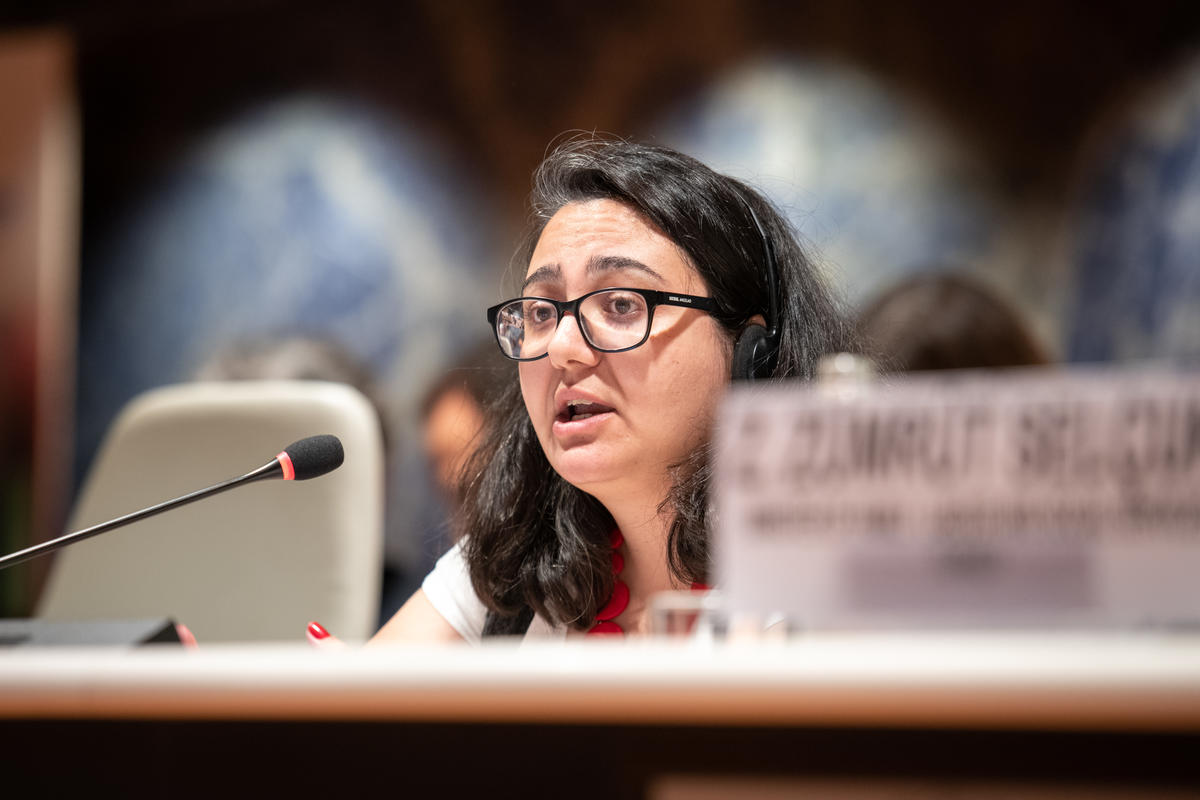
One of the priority areas at the Forum is livelihoods, where positive action to help refugees acquire new skills and find jobs can have a transformative impact on their lives and the prosperity of the communities that welcome them.
This afternoon, a high-level panel on jobs and livelihoods brought together speakers representing key stakeholders: Ethiopia as a major host country, Netherlands as a donor state, the International Labour Organization (ILO), the United Nations agency for the world of work, and the International Finance Corporation (IFC) from the World Bank Group. They were joined by a refugee entrepreneur originally from Syria now living in Brazil, Ms. Joanna Ibrahim.
The panel discussed the obstacles and opportunities for refugees to contribute to the economies of their host countries. Special attention was given to the legal and policy changes needed to create the conditions for increased inclusion and to promote access to decent work for all.
“I believe we have to invest in all human beings, especially the most vulnerable, which happens to be refugees and their host communities, which often bear the burdens,” said Sigrid Kaag, Minister for Foreign Trade and Development Cooperation, The Netherlands. “We need to focus on what refugees can be doing, treating them as agents of change and enabling access to shape their own destiny.”
An important takeaway was that refugees bring skills, potential and a high level of resilience. They are people who have been deprived of their livelihoods due to displacement and require assistance to resume their normal lives.
Participants agreed that long-term development strategies are needed in order to avoid adverse labour market effects and increase the resilience and cohesion of societies hosting refugees.
Syrian refugee Joanna Ibrahim told participants: “At the end of the day, refugees pay taxes, consume local products, and can even employ nationals - they can contribute positively to healthy, functioning markets. This restores their dignity.”
The panel stressed the importance of collaboration among humanitarian and development actors, arguing a multi-stakeholder approach to forced displacement can make a positive difference. Partnership with governments, and social actors is essential to increase decent work opportunities. Other important factors for improving livelihoods include investment in host countries from the private sector and international development finance organizations.
The speakers reflected on the pledge made by the Netherlands of EUR 500 million from 2019-2023 for eight countries severely affected by forced displacement, including Ethiopia. Within this programme, titled “PROSPECTS”, the Netherlands is working with the World Bank, IFC, ILO, UNICEF and UNHCR to improve prospects for refugees and their host communities by focusing on the nexus between education, protection and employment. Together, the partners aim to shift the paradigm from a humanitarian to a development approach to forced displacement.
“Refugees are contributors, not only earning for themselves but can be job creators as well,” said Ergogie Tesfaye, Ethiopia’s Minister for Labour and Social Affairs. “The Ethiopian government has recently adopted a progressive refugee proclamation and also working to bring refugees into development plans.”
Instagram account takeover!
Refugees are at the heart of the Forum, and today we've extended that to our Instagram account. Iranian refugee and co-chair of the UNHCR Global Youth Advisory Council, Arash Bordbar, has taken over the @refugeesLink is external account and will be covering the Forum for us in Geneva.

Mainstreaming mental health care in emergencies
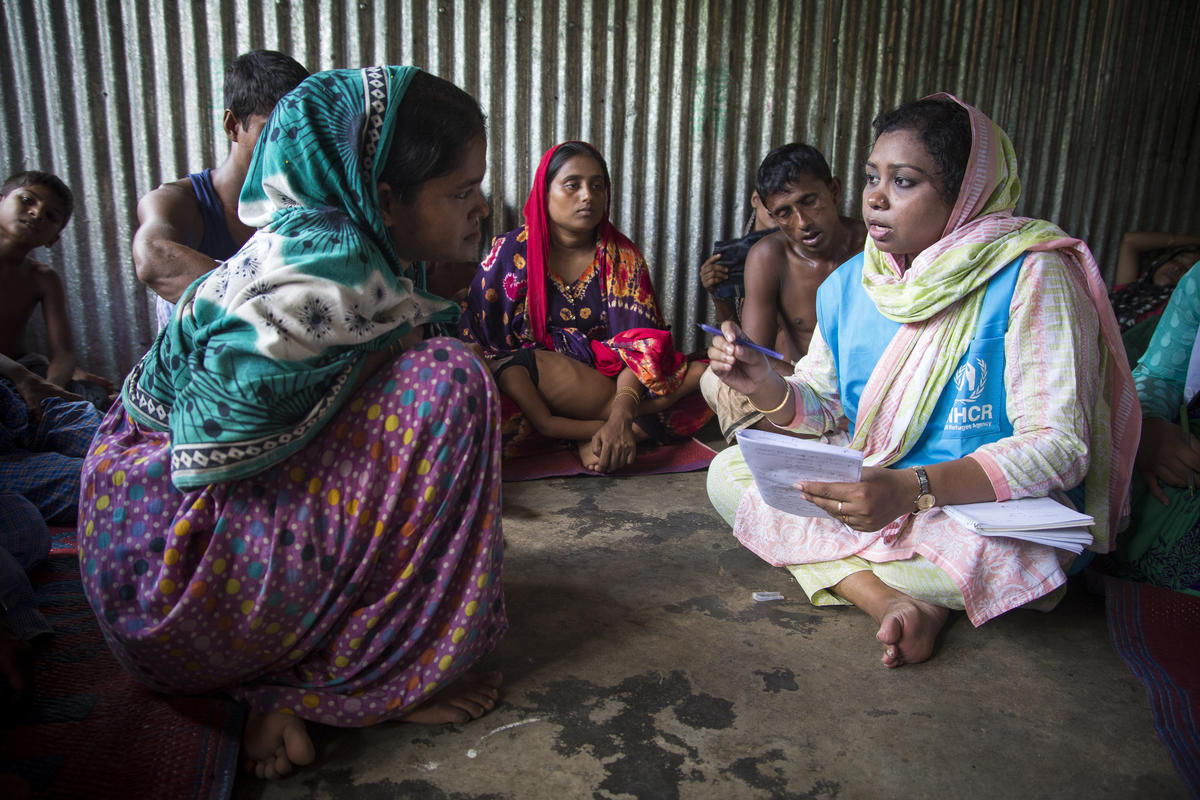
Arafat Uddin, a Rohingya refugee who fled violence in Myanmar in 2017, is now a trained psychosocial volunteer in Kutupalong, the world’s largest refugee settlement, in south-east Bangladesh.
“Before working as a psychosocial volunteer, I did not realize that our body and mind are connected. There was a lot of restlessness in my mind. I did not understand why I felt such tiredness and was thinking all the time about Myanmar,” he explained in a video shown at a Forum panel on mental health. “Now I understand that I felt physically exhausted due to my mental fatigue.”
Many refugees like Arafat suffer mental distress. The training he received from local NGO and UNHCR partner Gonoshashaya Kendra helped him to better understand his own issues and lead mental health workshops to help other refugees in the vast pop-up city of bamboo-framed and plastic-roofed homes.
“After attending the workshops, we can now deal with our distress. If we feel anger in ourselves, we know how to manage it,” he said, explaining that others in the community are now more at peace: “If people still feel distressed, after the workshops, they know that they have an opportunity to speak to the psychologists in the camps.”
One in five people who have experienced war or other conflict over the last 10 years have mental health conditions, according to the World Health OrganizationLink is external, WHO. Some five per cent suffer serious disorders, such as bipolar disorder, psychosis, severe forms of depression or posttraumatic stress disorder.
Just days before the Global Refugee Forum, the Red Cross and Red Crescent Movement passed an important resolutionLink is external calling for more investments to respond to mental health and psychosocial needs of people affected by armed conflicts, natural disasters and other emergencies.
The need to make mental health and psychosocial support an integral part of the humanitarian response in crisis and emergency situations around the world was discussed in depth at the panel today organized by the Government of the Netherlands, the Federation of Red Cross and Red Crescent Societies and WHO.
“Improving refugee mental health is no luxury but a vital element of the protection response,” argued Peter Ventevogel, UNHCR’s senior mental health officer, at the panel. "It helps build social cohesion within refugee communities and improves outcomes in health, livelihoods and education.”
UNHCR, WHO and IOM co-sponsored a special issue of the journal InterventionLink is external with 28 articles on mental health of Rohingya refugees including the story of Arafat.
Seeking financial inclusion for refugees and host communities
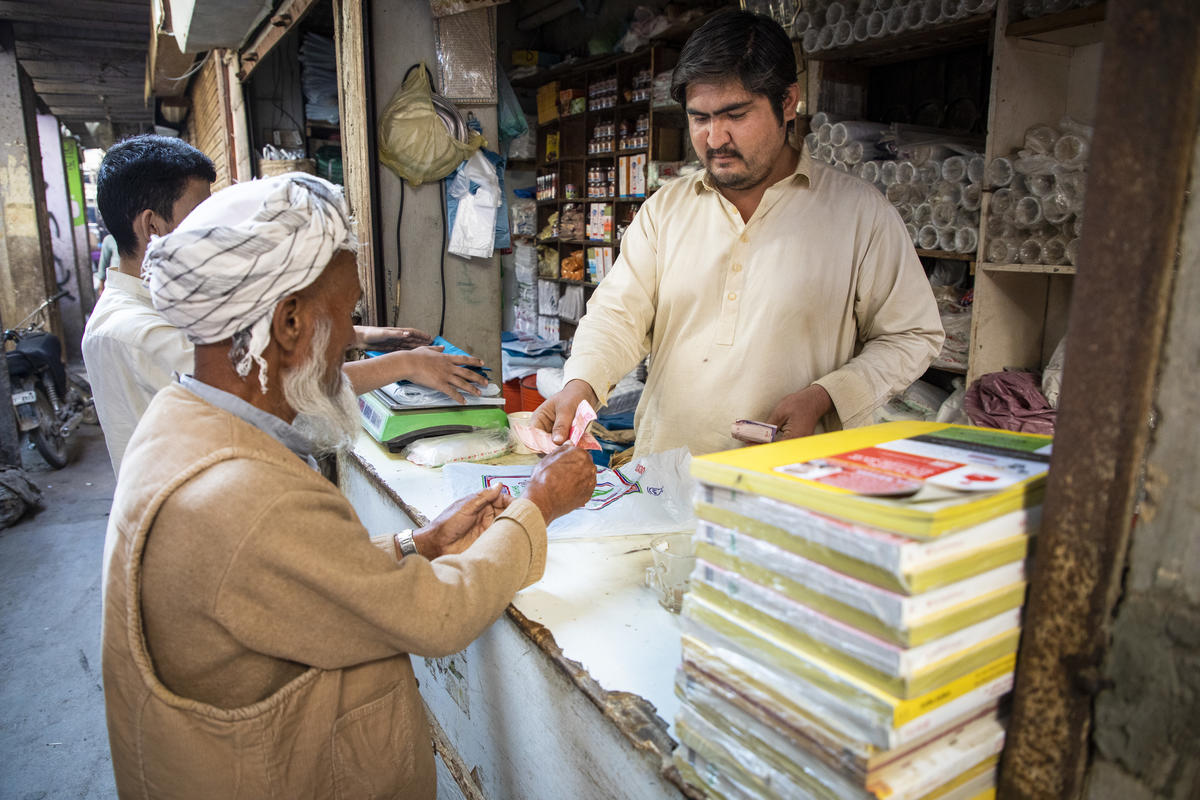
Having access to bank loans, credit lines, savings accounts and payment services are vital if you plan to buy a home, set up or expand a business, or even go shopping.
But for refugees, and too often the communities that host them, accessing the formal financial sector is one of the biggest challenges they face.
At the Global Refugee Forum expert panelists today sought to identify ways to include the underserved refugee market - along with their host communities - in the financial system, in a supported, sustainable and scalable way,
“As an organization committed to unlocking capital to help underserved communities thrive, Kiva is proud to work together with UNHCR in bringing financial services to displaced populations around the world,” said Lev Plaves, of crowdfunding platform KivaLink is external.
The development and private sector have a unique role to play in advancing access to financial services to refugees, by bringing together public and private funding to create market-based incentives.
The Forum heard about recent examples of financial inclusion projects in development around the world, including a four-year programme to promote access to financial and non-financial services for refugees and host communities in Uganda.
Under the measure, backed by UNHCR, the Grameen Credit Agricole FoundationLink is external and the Swedish International Development Agency (Sida)Link is external, around 100,000 refugees and Ugandans will be able to access credit and savings, 70 per cent of them women.
KivaLink is external, meanwhile, has recently established an institutional Refugee Investment FundLink is external which will work with institutional investors to provide capital to scale up proven refugee lending programs around the world, combining government support with private sector investment from leading foundations and faith-based investors.
In Jordan, the Dutch Entrepreneurial Development Bank FMOLink is external is piloting a risk-sharing facility for Syrian refugee entrepreneurs under its European Commission-funded NASIRALink is external program, with technical assistance provided by the Commission.
“Besides debt funding to be provided by investors, there is a need for philanthropic money in the more remote refugees settlements to support financial service providers opening their branches, create marketing materials in the language spoken by refugees, and provide non-financial services to refugees when needed,” said Philippe Guichandut, of Grameen Credit Agricole Foundation.
Transforming refugees lives through work
On Day 1 of the Forum, a panel featuring governments, business leaders and refugees looked at ways of boosting self-reliance among refugees through access to decent work.
One of the beneficiaries of such an approach is Famara, a 25-year-old refugee orginally from Gambia. He has described how getting a job with Japanese brand UNIQLO at one of their stores in Milan, as part of the company's programme to help refugees find work, has transformed his life.

German refugee higher education fund gets new partner in Denmark
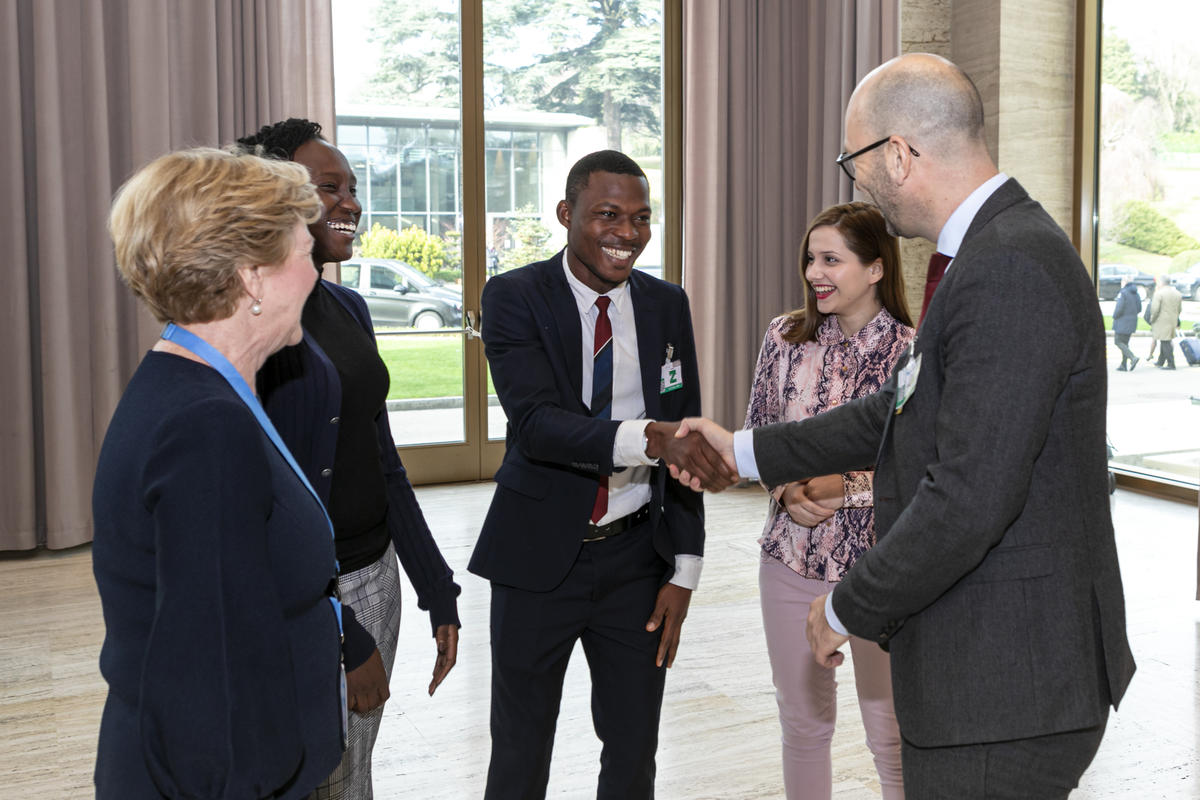
For years, young refugees around the world have faced a stark fact as they struggled to study in a new country. Only around 3 per cent ever manage to access university-level education.
There’s been a bright spot though: since 1992, the Albert Einstein German Academic Refugee Initiative (DAFI) has offered scholarships to refugees to enter tertiary education. In all, 15,500 young women and men have had a chance to get an undergraduate degree through the programme.
Now DAFI has a new partner: Denmark.
“Denmark is happy to announce a 10 million DKK (US$1.5 million) contribution to the DAFI programme in order to support young refugees in achieving a foundation for self-reliance and becoming active and contributing members of society – while in displacement and upon return,” said Danish Minister for Development Cooperation Rasmus Prehn.
The partnership should enable more refugees to access the programme. Overall, the aim is to raise the number of refugees who can access tertiary education from 3 percent to 15 percent by 2030, according to UNHCR, the UN Refugee Agency.
In 2019, a record number of over 8,000 students in 54 countries have been part of DAFI and next year the German government’s contribution will stand at 13.4 million Euro.
“Together we will support UNHCR to ensure access for refugees to university education in their countries of asylum. We encourage more countries to join our initiative,” said German Foreign Minister Heiko Maas. The Saïd Foundation and the Asfari Foundation in the United Kingdom also support the programme.
Denmark and Germany announced the partnership at the Global Refugee Forum, and UN High Commissioner Filippo Grandi said it epitomized the event’s aim of empowering refugees.
Felix Sesay, DAFI student in Ghana and a refugee co-sponsor of the Forum, concludes: “DAFI has changed my life fundamentally, I am really happy that so many more refugee youth will be able to benefit from this scholarship programme!”.
Clean Energy Challenge launches
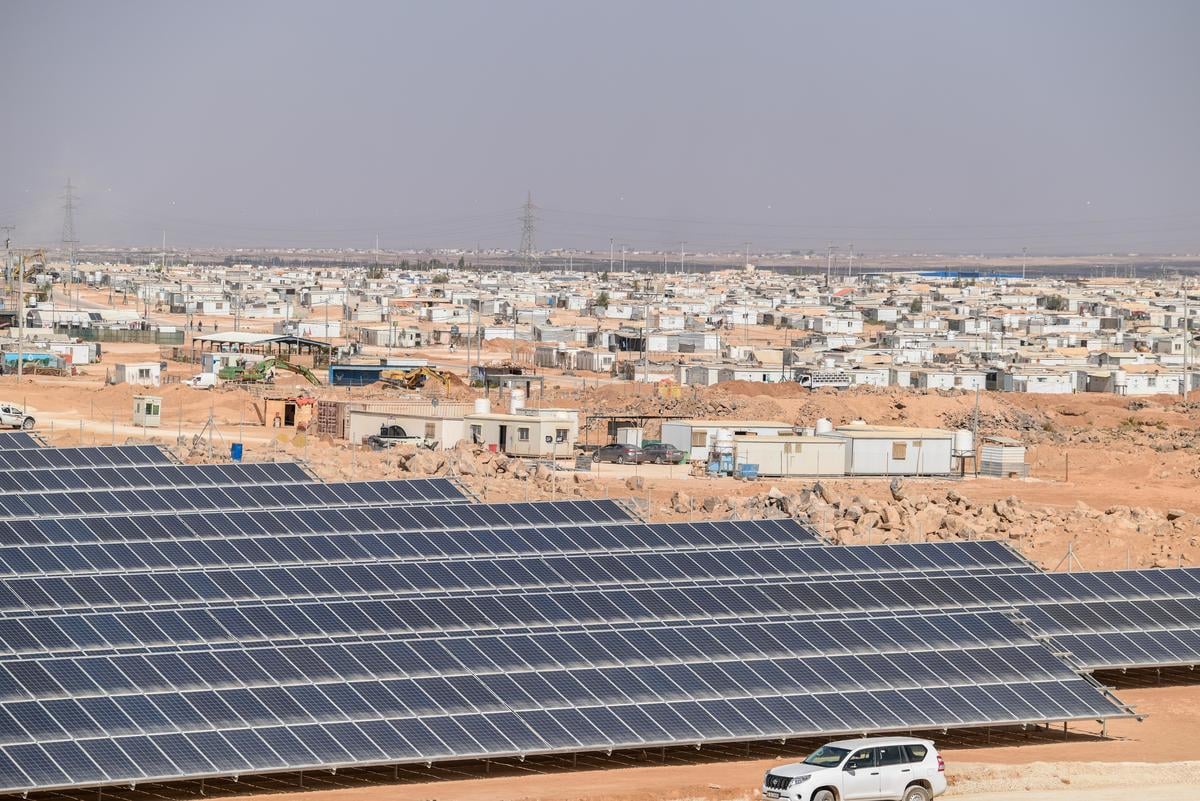
The availability of energy resources for things like cooking and electrification is a major issue facing refugees and the forcibly displaced globally, with most having limited or no access to energy, let alone from clean and sustainable sources. Some 90 per cent of refugees living in settlements worldwide currently have no access to energy at all.
In response, UNHCR today launched the Clean Energy Challenge, an ambitious agenda to enhance clean energy access for refugees and host communities. It invites States, the private sector, NGOs, development actors and other stakeholders to join forces in ensuring that all refugee settlements and nearby host communities will have access to affordable, sustainable and modern energy by 2030, in line with the Sustainable Development Goals.
What this means in practice is that all refugees and host communities will have access to clean energy to cook their food and adequate electricity to power their lives. Street lighting and common spaces such as schools, hospitals, community centres and businesses will be powered by cleaner energy, and water supplies will be made more efficient.
The Challenge is both a high-level vision statement, and a tangible expression of international solidarity in support of refugees and host communities, which will require bold and concrete action from 2020 onward. In response, almost 40 states and stakeholders have already come forward with their own energy pledges.
“We have a unique opportunity to come together and deliver a fundamental human right, one that so many often take for granted,” said UNHCR Deputy High Commissioner Kelly Clements
“It will not only boost the basic safety and protection of refugees, but also enable them to learn, establish businesses and be more productive members of their communities. This Challenge – ensuring that refugees and generous hosts can have access to clean energy – can only be achieved by us all working together”.
Joining the Challenge represents an expression of support for its goals and a common belief that climate action is a joint responsibility. Find out more by visiting the dedicated web page and watching the explainer video.
Join the Clean Energy Challenge: #HumanitarianEnergyLink is external
What are the best solutions for refugees? Let's ask them...
Some 3,000 delegates are attending the Forum representing governments, international organizations, the private sector and civil society among others, all coming together to find new approaches and solutions to the global displacement crisis.
But when it comes to identifying what support is of most benefit to refugees, who better to ask than refugees themselves?
That is exactly what UN Secretary-General António Guterres decided to do, taking advantage of the presence of some 80 refugee delegates at the Forum to ask them what the international community should be doing to help improve the lives of refugees.
The responses from Hina, Trésor and Diego were clear: education, inclusivity and a chance to become self-reliant and give back to society.

A sweet surprise from Ben and Jerry’s Ice Cream
Ben and Jerry’s Ice Cream has given the Forum a sweet surprise by launching a new flavour, Cone Together, as part of their ongoing work to support refugees.
The new awareness-raising flavor combines chocolate waffle, salted caramel and vanilla ice-cream. It also comes with extra commitments to help refugees.

As long-time members of UNHCR’s #WithRefugees coalition, Ben and Jerry’s used the launch to pledge to guide at least 400 refugees a year through their Ice Academy by 2022 and bring on 250,000 people to support refugees through local campaigns.
The Ice Academy promotes refugee entrepreneurship through business education, helping refugees launch their own companies and also giving them first-hand experience of running a business through managing their own ice-cream stand. This is how Joudy, an Academy graduate, spent her day when she was on the programme: https://www.youtube.com/watch?v=yOufvJzJxHc&t=15sLink is external
Follow these links to see updates from Day 1 and Day 2
For more information, please visit the Global Refugee Forum web page
For a complete list of pledges at the Global Refugee Forum, see the dashboard hereLink is external.








